北师大版(2019)选择性必修第三册Unit 7 Careers Lesson 3 Meet the new boss you 课件(共30张PPT)
文档属性
| 名称 | 北师大版(2019)选择性必修第三册Unit 7 Careers Lesson 3 Meet the new boss you 课件(共30张PPT) |
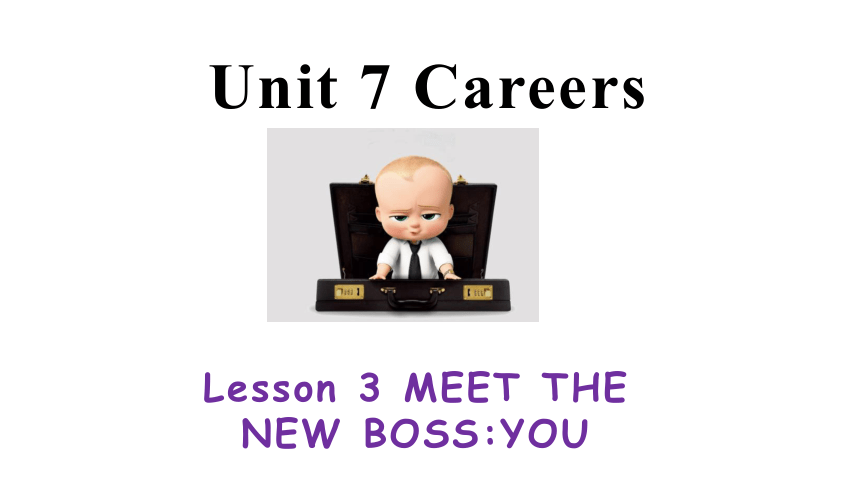
|
|
| 格式 | pptx | ||
| 文件大小 | 7.3MB | ||
| 资源类型 | 教案 | ||
| 版本资源 | 北师大版(2019) | ||
| 科目 | 英语 | ||
| 更新时间 | 2024-03-08 14:20:09 | ||
图片预览


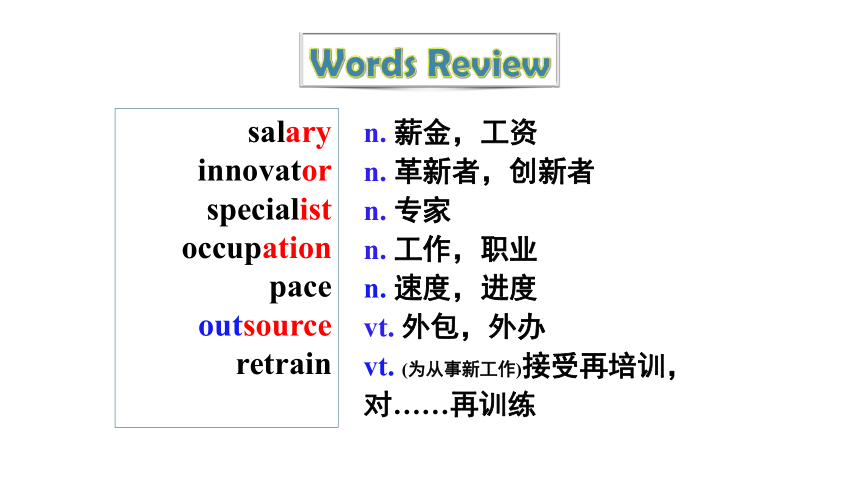
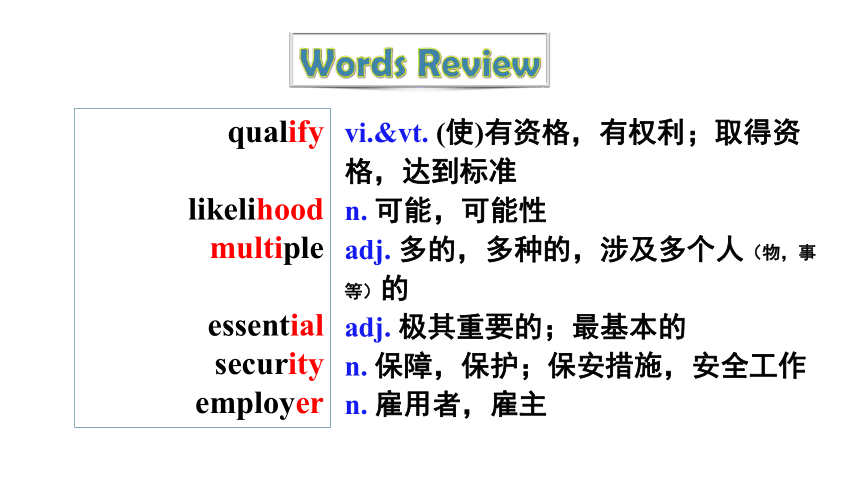
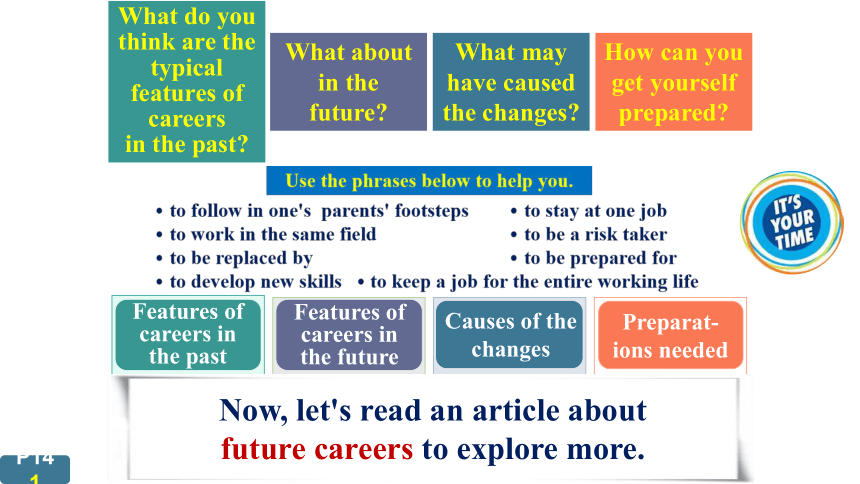
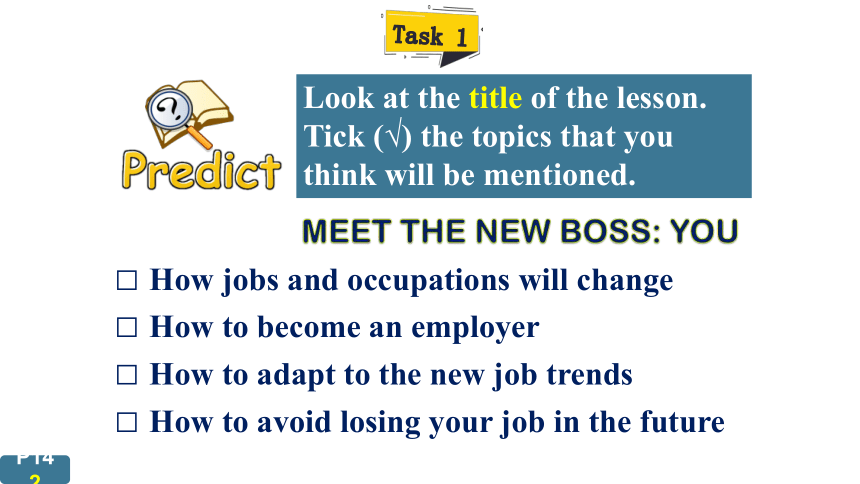
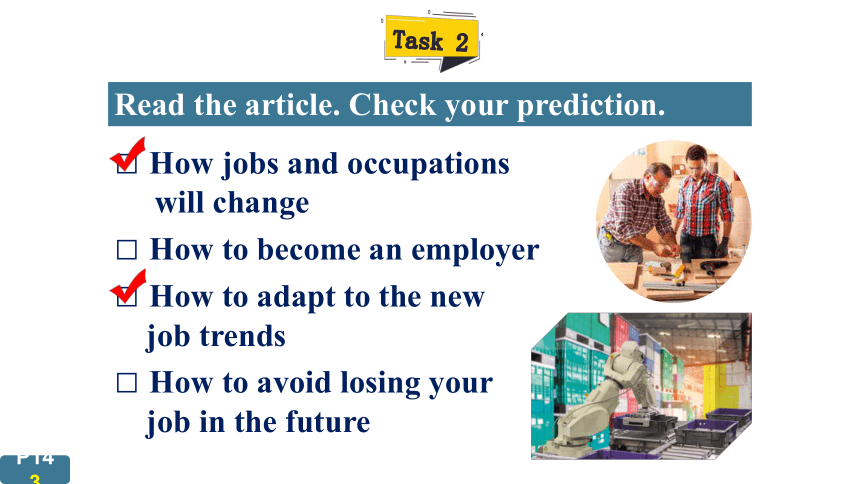
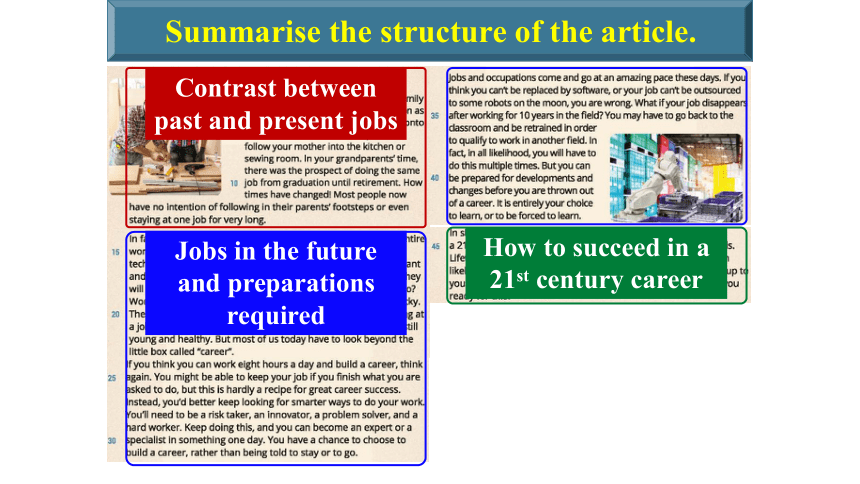
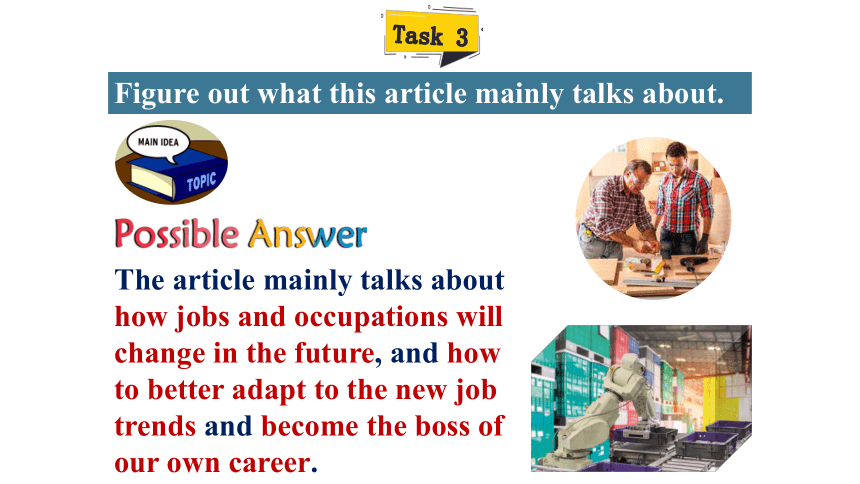
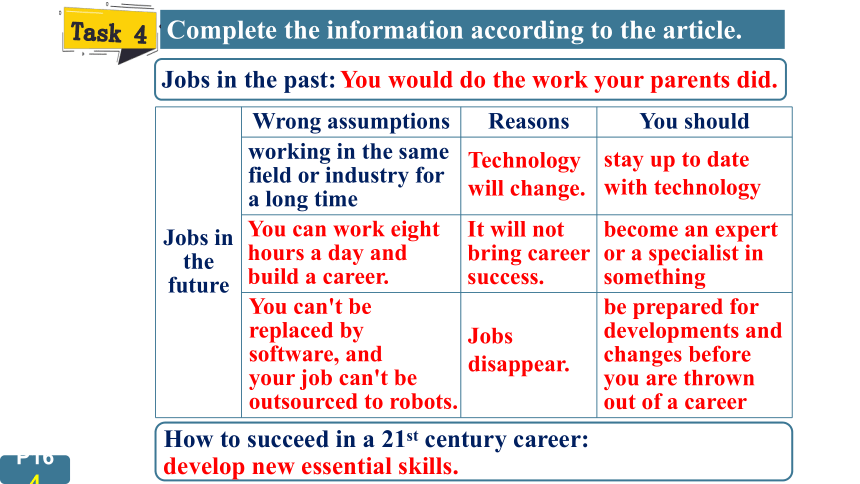

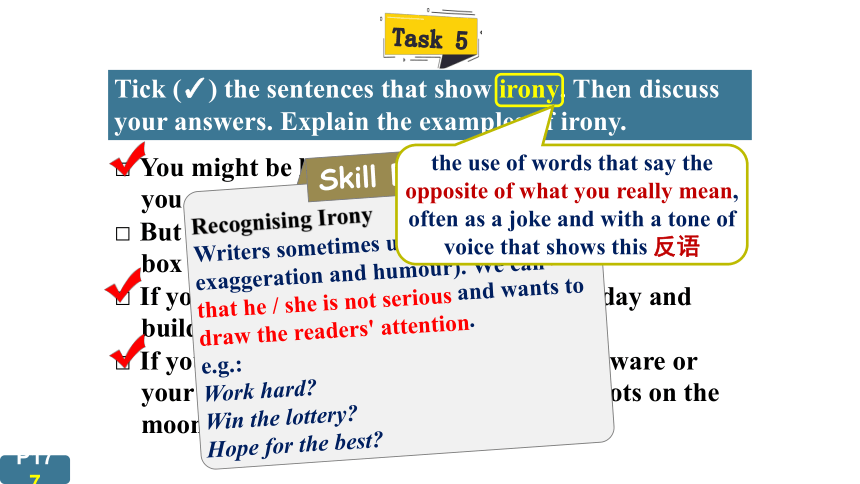
文档简介
(共30张PPT)
Unit 7 Careers
Lesson 3 MEET THE NEW BOSS:YOU
footstep
follow in one's footsteps
profession
workshop
prospect
retirement
relevant
lottery
decent
n. 脚步声
继承某人的事业,步某人的后尘
n. 专业,行业
n. 车间,工厂
n. 可能性,希望
n. 退休,退职
adj. 有关的,切题的
n. 抽彩给奖法;碰运气的事
adj. 相当好的,像样的,可接受的
Read after the tape and speak out the Chinese immediately.
salary
innovator
specialist
occupation
pace
outsource
retrain
n. 薪金,工资
n. 革新者,创新者
n. 专家
n. 工作,职业
n. 速度,进度
vt. 外包,外办
vt. (为从事新工作)接受再培训,对……再训练
qualify
likelihood
multiple
essential
security
employer
vi.&vt. (使)有资格,有权利;取得资格,达到标准
n. 可能,可能性
adj. 多的,多种的,涉及多个人(物,事等)的
adj. 极其重要的;最基本的
n. 保障,保护;保安措施,安全工作
n. 雇用者,雇主
Features of careers in the past
Preparat-ions needed
Features of careers in the future
Causes of the changes
What do you think are the typical features of careers
in the past
What about in the
future
What may have caused the changes
How can you get yourself prepared
to stay at one job …
to be replaced by software …
technology
…
to develop new skills
…
Now, let's read an article about
future careers to explore more.
P14 1
Task 1
Look at the title of the lesson.
Tick (√) the topics that you think will be mentioned.
□ How jobs and occupations will change
□ How to become an employer
□ How to adapt to the new job trends
□ How to avoid losing your job in the future
P14 2
Read the article. Check your prediction.
Task 2
□ How jobs and occupations
will change
□ How to become an employer
□ How to adapt to the new
job trends
□ How to avoid losing your
job in the future
P14 3
Summarise the structure of the article.
Contrast between past and present jobs
Jobs in the future and preparations required
How to succeed in a 21st century career
Task 3
Figure out what this article mainly talks about.
The article mainly talks about how jobs and occupations will change in the future, and how to better adapt to the new job trends and become the boss of our own career.
Complete the information according to the article.
Task 4
Jobs in the past:
You would do the work your parents did.
Jobs in the future Wrong assumptions Reasons You should
working in the same field or industry for a long time
How to succeed in a 21st century career:
Technology will change.
stay up to date with technology
You can work eight hours a day and build a career.
It will not bring career success.
become an expert or a specialist in something
You can't be replaced by software, and
your job can't be outsourced to robots.
Jobs disappear.
be prepared for developments and changes before you are thrown out of a career
develop new essential skills.
P16 4
In the last paragraph the writer asked a question “Are you ready for this ” What is the writer’s purpose
□ A. To make readers recall the key points mentioned above.
□ B. To make readers agree with his/her opinions on future career trends.
□ C. To make readers relate to themselves and think about their future career.
Task 5
Tick ( ) the sentences that show irony. Then discuss your answers. Explain the examples of irony.
□ You might be lucky. These strategies might bring
you a nice, comfortable life…
□ But most of us today have to look beyond the little
box called “career”.
□ If you think you can work eight hours a day and
build a career, think again.
□ If you think you can't be replaced by software or
your job can't be outsourced to some robots on the
moon, you are wrong.
Skill Builder
Recognising Irony
Writers sometimes use irony (sarcasm, exaggeration and humour). We can infer that he / she is not serious and wants to draw the readers' attention.
e.g.:
Work hard
Win the lottery
Hope for the best
the use of words that say the opposite of what you really mean, often as a joke and with a tone of voice that shows this 反语
P17 7
1. _________ in one's parents' footsteps
2. _________ the same profession
3. _________ the lottery
4. _________ a decent salary
5. _________ a career
6. _________ new essential skills
Find verbs in the article to complete the collocations.
follow
join
win
earn
build
develop
P16 6
继承某人的事业
a collocation is a group of words that
are often said together.
Knowing collocations in English will help you predict the next word a speaker will say.
Complete the sentences with the collocations.
1. John ____________________________ and became a sailor.
2. Mary is determined to _____________ in banking after she
graduates from university.
3. You have to _______________________ to stand out in the
competitive job market.
4. You must keep learning and work hard, instead of daydreaming
to ______________.
5. He __________________ of $200,000 a year.
6. Tom ________________________ as his mother to become a
teacher.
1. follow in one's parents' footsteps 2. join the same profession
3. win the lottery 4. earn a decent salary
5. build a career 6. develop new essential skills
followed in his father's footsteps
build a career
develop new essential skills
win the lottery
earns a decent salary
joined the same profession
P16 6
Up until the 1980s, people regularly 1. ____________________
________________ by working in the family business or joining the same profession as them, or they stayed at one job for very long.
Now, most people have no intention of doing so. In fact, planning to work in the same 2. ______________ for your entire working life isn't practical. Because 3. __________ will make the skills you have now out of date. You have to look 4. ___________ ________ called “career”. The belief that you can work 5. _____ ___________ and build a career is wrong. You'd better go on looking for 6. ____________ to do your work. You need to be a risk taker, an innovator, a problem solver and a hard worker.
Complete the summary using the information in the article.
followed in their
parents' footsteps
field or industry
technology
beyond the
little box
eight
hours a day
smarter ways
When you become 7. ______________________ in something one day, you will have a chance to choose to build a career. If you think you can't be 8. ________ by software, or your job can't be outsourced to some robots, you are wrong. Your job may disappear one day. You should 9. ____________ all the time.
In short, if you want to succeed in a future career, you'll have to develop 10. ________________. You are the boss of your career, and it's up to you to decide what you can do and how well you can do it.
an expert or a specialist
replaced
keep learning
new essential skills
Up until the 1980s, people in many countries1_________(regular) followed in their parents' footsteps when choosing jobs. How times have changed! Most people now have no2________ (intend) of staying at one job for very long. In fact,3_________(plan) to work in the same field or industry for your entire working life just isn't practical anymore. The skills you have now are unlikely to remain relevant and be enough4_________(help) you through your entire career.5_________(build) a career,you’d better keep looking for 6_________(smart) ways to do your work.
regularly
intention
planning
to help
To build
smarter
You'll need to be a risk taker, an innovator,a problem solver, and a hard worker. Keep doing this,7__________you can become an expert or a specialist in something one day. Jobs and occupations come and go at 8_________amazing pace these days. You may have to go back to the classroom and be retrained in order to qualify to work in another field. The truth is 9_________you are the boss of your career, and it is up to you__________(decide) what you can do and how well you can do it.
and
an
that
to decide
Discussion
1. Why does the writer think the
“new boss” is “you”
2. On what points do you agree
or disagree with the writer
Give your reasons.
3. In Paragraphs 2-4, the writer
discusses some of the wrong
assumptions. Why does the
writer do this
P16 5
1. Why does the writer think the “new boss”
is “you”
The author stated clearly at the end: If you want to succeed in a 21st century career, you will have to develop new essential skills. Lifetime security from one employer is no longer certain or even likely. The truth is that you are the boss of your career, and it is up to you to decide what you can do and how well you can do it. This means that you are responsible for your future.
2. On what points do you agree or disagree
with the writer Give your reasons.
Helpful Points:
Working in the same field or industry for your
entire working life just isn't practical anymore.
You can't build a career if you work only eight
hours a day.
You can be replaced by software, and your job
can be outsourced to robots.
…
3. In Paragraphs 2-4, the writer discusses some
of the wrong assumptions. Why does the
writer do this
The writer uses this way to emphasise what is
wrong and invite readers to pay more attention
on what he or she says about the real trend about
the future.
The writer discusses some of the wrong
assumptions in order to make the readers reflect
and realise that what common people think at
present will no longer be true in the future and
that they have no other choices but to walk out of
their comfort zone and be their own boss.
P17 10
What jobs have disappeared in the past 10
years
What new jobs do you think will appear
in the next 10 years
Disappear:
Truck drivers
Security guards…
Appear:
Food engineer
Robot operator…
1. Adaptability and flexibility:
the skills that equip you for any challenge
2. Analytical skills:
the ability to make sense of data
3. Commercial awareness:
it is how the industry fits together
4. Communication skills:
the skill that sustains information flow
What should we do to adapt to the career changes
Critical thinking
5. Creativity:
fresh thinking is of great importance
6. Emotional intelligence:
a secret ingredient for career success
7. Influencing skills:
inspiring confidence in others
8. Leadership and management:
prove you are more than an entry-level hire
…
Critical thinking
What should we do to adapt to the career changes
1. follow in one's footsteps
2. be unlikely to
3. out of date
4. come and go
5. throw sb. out (of…)
6. be up to you
继承某人的事业,步某人的后尘
不可能
过时的
来来往往
撵走;轰走;逐出
一切由你;你说了算
1. Have you found out the information of career trends from the past and for the future
2. Have you understood specific information and had critical thinking about new job trends
3. Can you use Negative Expressions correctly
各个击破
Self-evaluation
1. Finish the exercises in Learning English.
2. Write a short passage about what you can do to
be “the new boss” in the future.
3. Write a short passage about one job that you'd
like to do (but your parents might strongly
oppose).
Try to argue reasonably and state how you will
get prepared for the job.
Unit 7 Careers
Lesson 3 MEET THE NEW BOSS:YOU
footstep
follow in one's footsteps
profession
workshop
prospect
retirement
relevant
lottery
decent
n. 脚步声
继承某人的事业,步某人的后尘
n. 专业,行业
n. 车间,工厂
n. 可能性,希望
n. 退休,退职
adj. 有关的,切题的
n. 抽彩给奖法;碰运气的事
adj. 相当好的,像样的,可接受的
Read after the tape and speak out the Chinese immediately.
salary
innovator
specialist
occupation
pace
outsource
retrain
n. 薪金,工资
n. 革新者,创新者
n. 专家
n. 工作,职业
n. 速度,进度
vt. 外包,外办
vt. (为从事新工作)接受再培训,对……再训练
qualify
likelihood
multiple
essential
security
employer
vi.&vt. (使)有资格,有权利;取得资格,达到标准
n. 可能,可能性
adj. 多的,多种的,涉及多个人(物,事等)的
adj. 极其重要的;最基本的
n. 保障,保护;保安措施,安全工作
n. 雇用者,雇主
Features of careers in the past
Preparat-ions needed
Features of careers in the future
Causes of the changes
What do you think are the typical features of careers
in the past
What about in the
future
What may have caused the changes
How can you get yourself prepared
to stay at one job …
to be replaced by software …
technology
…
to develop new skills
…
Now, let's read an article about
future careers to explore more.
P14 1
Task 1
Look at the title of the lesson.
Tick (√) the topics that you think will be mentioned.
□ How jobs and occupations will change
□ How to become an employer
□ How to adapt to the new job trends
□ How to avoid losing your job in the future
P14 2
Read the article. Check your prediction.
Task 2
□ How jobs and occupations
will change
□ How to become an employer
□ How to adapt to the new
job trends
□ How to avoid losing your
job in the future
P14 3
Summarise the structure of the article.
Contrast between past and present jobs
Jobs in the future and preparations required
How to succeed in a 21st century career
Task 3
Figure out what this article mainly talks about.
The article mainly talks about how jobs and occupations will change in the future, and how to better adapt to the new job trends and become the boss of our own career.
Complete the information according to the article.
Task 4
Jobs in the past:
You would do the work your parents did.
Jobs in the future Wrong assumptions Reasons You should
working in the same field or industry for a long time
How to succeed in a 21st century career:
Technology will change.
stay up to date with technology
You can work eight hours a day and build a career.
It will not bring career success.
become an expert or a specialist in something
You can't be replaced by software, and
your job can't be outsourced to robots.
Jobs disappear.
be prepared for developments and changes before you are thrown out of a career
develop new essential skills.
P16 4
In the last paragraph the writer asked a question “Are you ready for this ” What is the writer’s purpose
□ A. To make readers recall the key points mentioned above.
□ B. To make readers agree with his/her opinions on future career trends.
□ C. To make readers relate to themselves and think about their future career.
Task 5
Tick ( ) the sentences that show irony. Then discuss your answers. Explain the examples of irony.
□ You might be lucky. These strategies might bring
you a nice, comfortable life…
□ But most of us today have to look beyond the little
box called “career”.
□ If you think you can work eight hours a day and
build a career, think again.
□ If you think you can't be replaced by software or
your job can't be outsourced to some robots on the
moon, you are wrong.
Skill Builder
Recognising Irony
Writers sometimes use irony (sarcasm, exaggeration and humour). We can infer that he / she is not serious and wants to draw the readers' attention.
e.g.:
Work hard
Win the lottery
Hope for the best
the use of words that say the opposite of what you really mean, often as a joke and with a tone of voice that shows this 反语
P17 7
1. _________ in one's parents' footsteps
2. _________ the same profession
3. _________ the lottery
4. _________ a decent salary
5. _________ a career
6. _________ new essential skills
Find verbs in the article to complete the collocations.
follow
join
win
earn
build
develop
P16 6
继承某人的事业
a collocation is a group of words that
are often said together.
Knowing collocations in English will help you predict the next word a speaker will say.
Complete the sentences with the collocations.
1. John ____________________________ and became a sailor.
2. Mary is determined to _____________ in banking after she
graduates from university.
3. You have to _______________________ to stand out in the
competitive job market.
4. You must keep learning and work hard, instead of daydreaming
to ______________.
5. He __________________ of $200,000 a year.
6. Tom ________________________ as his mother to become a
teacher.
1. follow in one's parents' footsteps 2. join the same profession
3. win the lottery 4. earn a decent salary
5. build a career 6. develop new essential skills
followed in his father's footsteps
build a career
develop new essential skills
win the lottery
earns a decent salary
joined the same profession
P16 6
Up until the 1980s, people regularly 1. ____________________
________________ by working in the family business or joining the same profession as them, or they stayed at one job for very long.
Now, most people have no intention of doing so. In fact, planning to work in the same 2. ______________ for your entire working life isn't practical. Because 3. __________ will make the skills you have now out of date. You have to look 4. ___________ ________ called “career”. The belief that you can work 5. _____ ___________ and build a career is wrong. You'd better go on looking for 6. ____________ to do your work. You need to be a risk taker, an innovator, a problem solver and a hard worker.
Complete the summary using the information in the article.
followed in their
parents' footsteps
field or industry
technology
beyond the
little box
eight
hours a day
smarter ways
When you become 7. ______________________ in something one day, you will have a chance to choose to build a career. If you think you can't be 8. ________ by software, or your job can't be outsourced to some robots, you are wrong. Your job may disappear one day. You should 9. ____________ all the time.
In short, if you want to succeed in a future career, you'll have to develop 10. ________________. You are the boss of your career, and it's up to you to decide what you can do and how well you can do it.
an expert or a specialist
replaced
keep learning
new essential skills
Up until the 1980s, people in many countries1_________(regular) followed in their parents' footsteps when choosing jobs. How times have changed! Most people now have no2________ (intend) of staying at one job for very long. In fact,3_________(plan) to work in the same field or industry for your entire working life just isn't practical anymore. The skills you have now are unlikely to remain relevant and be enough4_________(help) you through your entire career.5_________(build) a career,you’d better keep looking for 6_________(smart) ways to do your work.
regularly
intention
planning
to help
To build
smarter
You'll need to be a risk taker, an innovator,a problem solver, and a hard worker. Keep doing this,7__________you can become an expert or a specialist in something one day. Jobs and occupations come and go at 8_________amazing pace these days. You may have to go back to the classroom and be retrained in order to qualify to work in another field. The truth is 9_________you are the boss of your career, and it is up to you__________(decide) what you can do and how well you can do it.
and
an
that
to decide
Discussion
1. Why does the writer think the
“new boss” is “you”
2. On what points do you agree
or disagree with the writer
Give your reasons.
3. In Paragraphs 2-4, the writer
discusses some of the wrong
assumptions. Why does the
writer do this
P16 5
1. Why does the writer think the “new boss”
is “you”
The author stated clearly at the end: If you want to succeed in a 21st century career, you will have to develop new essential skills. Lifetime security from one employer is no longer certain or even likely. The truth is that you are the boss of your career, and it is up to you to decide what you can do and how well you can do it. This means that you are responsible for your future.
2. On what points do you agree or disagree
with the writer Give your reasons.
Helpful Points:
Working in the same field or industry for your
entire working life just isn't practical anymore.
You can't build a career if you work only eight
hours a day.
You can be replaced by software, and your job
can be outsourced to robots.
…
3. In Paragraphs 2-4, the writer discusses some
of the wrong assumptions. Why does the
writer do this
The writer uses this way to emphasise what is
wrong and invite readers to pay more attention
on what he or she says about the real trend about
the future.
The writer discusses some of the wrong
assumptions in order to make the readers reflect
and realise that what common people think at
present will no longer be true in the future and
that they have no other choices but to walk out of
their comfort zone and be their own boss.
P17 10
What jobs have disappeared in the past 10
years
What new jobs do you think will appear
in the next 10 years
Disappear:
Truck drivers
Security guards…
Appear:
Food engineer
Robot operator…
1. Adaptability and flexibility:
the skills that equip you for any challenge
2. Analytical skills:
the ability to make sense of data
3. Commercial awareness:
it is how the industry fits together
4. Communication skills:
the skill that sustains information flow
What should we do to adapt to the career changes
Critical thinking
5. Creativity:
fresh thinking is of great importance
6. Emotional intelligence:
a secret ingredient for career success
7. Influencing skills:
inspiring confidence in others
8. Leadership and management:
prove you are more than an entry-level hire
…
Critical thinking
What should we do to adapt to the career changes
1. follow in one's footsteps
2. be unlikely to
3. out of date
4. come and go
5. throw sb. out (of…)
6. be up to you
继承某人的事业,步某人的后尘
不可能
过时的
来来往往
撵走;轰走;逐出
一切由你;你说了算
1. Have you found out the information of career trends from the past and for the future
2. Have you understood specific information and had critical thinking about new job trends
3. Can you use Negative Expressions correctly
各个击破
Self-evaluation
1. Finish the exercises in Learning English.
2. Write a short passage about what you can do to
be “the new boss” in the future.
3. Write a short passage about one job that you'd
like to do (but your parents might strongly
oppose).
Try to argue reasonably and state how you will
get prepared for the job.
